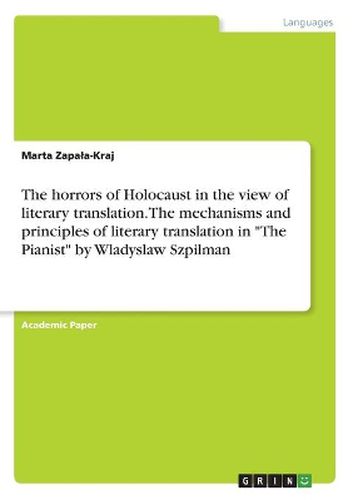Readings Newsletter
Become a Readings Member to make your shopping experience even easier.
Sign in or sign up for free!
You’re not far away from qualifying for FREE standard shipping within Australia
You’ve qualified for FREE standard shipping within Australia
The cart is loading…






Academic Paper from the year 2018 in the subject Interpreting / Translating, grade: 5.0, language: English, abstract: The primary aim of this thesis is to present the art of literary translation through the perspective of a book. This book was written by the musician Wladyslaw Szpilman and depicts his life. Szpilman is a survivor of the Warsaw Ghetto, which is the period in Polish history that was shadowed by the horrors of mass murders both on Polish and Jewish nations. Translation gives us access to the literature of the world. It allows us to enter the minds of people from other places. And it enriches not only our personal knowledge and artistic sense, but also our culture's literature, language, and thought. Still, literary translation is an odd art. It consists of a person sitting at a desk, writing literature that is not his or her own but has someone else's name on it. Like a musician, a literary translator takes someone else's composition and performs it in his own special way. Just as a musician embodies someone else's notes by moving his body or throat, a translator embodies someone else's thoughts and images by writing in another language.
$9.00 standard shipping within Australia
FREE standard shipping within Australia for orders over $100.00
Express & International shipping calculated at checkout
Academic Paper from the year 2018 in the subject Interpreting / Translating, grade: 5.0, language: English, abstract: The primary aim of this thesis is to present the art of literary translation through the perspective of a book. This book was written by the musician Wladyslaw Szpilman and depicts his life. Szpilman is a survivor of the Warsaw Ghetto, which is the period in Polish history that was shadowed by the horrors of mass murders both on Polish and Jewish nations. Translation gives us access to the literature of the world. It allows us to enter the minds of people from other places. And it enriches not only our personal knowledge and artistic sense, but also our culture's literature, language, and thought. Still, literary translation is an odd art. It consists of a person sitting at a desk, writing literature that is not his or her own but has someone else's name on it. Like a musician, a literary translator takes someone else's composition and performs it in his own special way. Just as a musician embodies someone else's notes by moving his body or throat, a translator embodies someone else's thoughts and images by writing in another language.